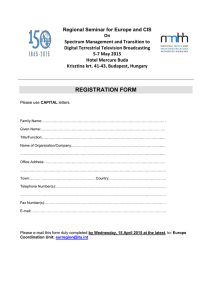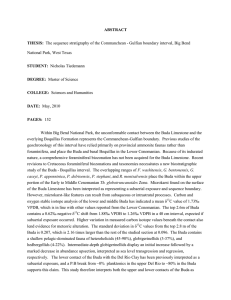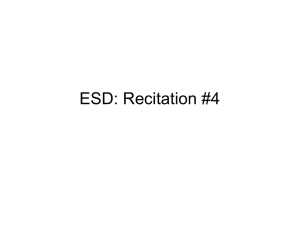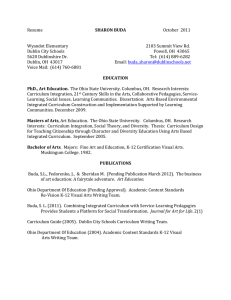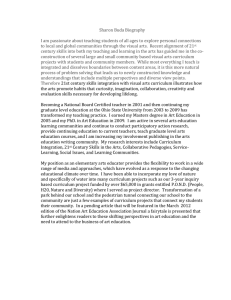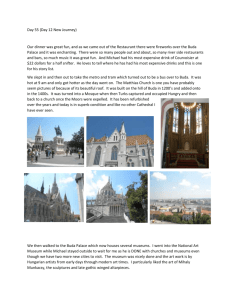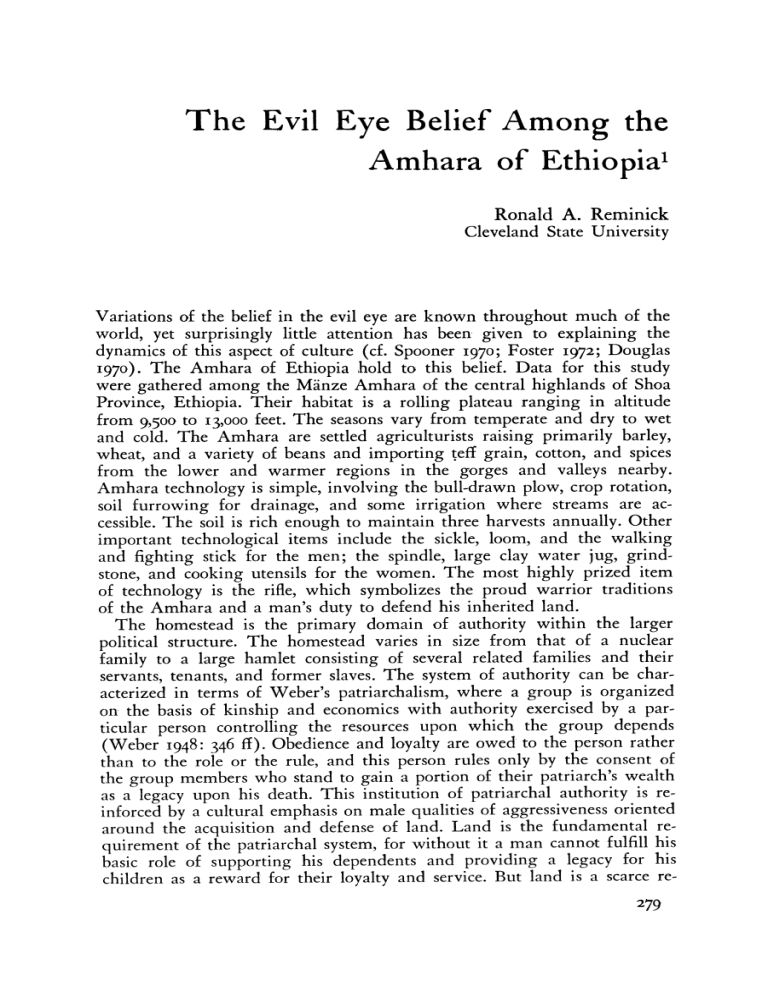
The Evil Eye Among Belief Amhara of the Ethiopia1 Ronald A Reminick ClevelandStateUniversity muchof the of the beliefin the evil eye areknownthroughout Variations little attentionhas been given to explainingthe world,yet surprisingly dynamicsof this aspectof culture(cf. SpoonerI970; FosterI972; Douglas hold to this belief.Data for this study The Amharaof Ethio-pia I970). weregatheredamongthe ManzeAmharaof the centralhighlandsof Shoa Province,Ethiopia.Theirhabitatis a rollingplateaurangingin altitude and dryto wet fromg,sooto I3>000 feet.The seasonsvaryfromtemperate raisingprimarilybarley, and cold.The Amharaare settledagriculturists wheat,and a varietyof beansand importingteff grain cotton,and spices from the lower and warmerregionsin the gorgesand valleysrlearby. plow,croprotation, is simple,involvingthe bull-drawn Amharatechnology soil furrowingfor drainage,and some irrigationwhere streamsare accessible.The soil is richenoughto maintainthreeharvestsannually.Other itemsincludethe sicklenloom, and the walking importanttechnological and fightingstickfor the men; the spindle largeclay waterjug grindstone,and cookingutensilsfor the women.The mosthighlyprizeditem of technologyis the ride whichsymbolizesthe proudwarriortraditions of the Amharaanda man'sdutyto defendhis inheritedland. The homesteadis the primarydomainof authoritywithin the larger politicalstructure.The homesteadvariesin size from that of a nuclear familyto a largehamletconsistingof severalrelatedfamiliesand their servants,tenants,and formerslaves.The systemof authoritycan be charwherea groupis organized acterizedin termsof Weberspatriarchalism, on the basisof kinshipand economicswith authorityexercisedby a particularpersoncontrollingthe resourcesupon which the group depends andloyaltyareowedto the personrather (WeberI948: 346H). Obedience this personrulesonly by the consentof and rule, or the role the to than wealth the grolupmemberswho standto gaina portionof theirpatriarch's authorityis reas a legacyuponhis death.This institutionof patriarchal oriented inforcedby a culturalemphasison malequalitiesof aggressiveness rearoundthe acquisitionand defenseof land.Landis the fundamental system,for withoutit a mancannotfulfillhis of the patriarchal quirement hasicrole of supportinghis dependentsand providinga legacyfor his childrenas a rewardfor theirloyaltyand service.But landis a scarcere27g 280 ETHNOLOGY source,and thereare often moreclaimsto land than can be supported. Thus,closestsiblingsmayuniteagainsta moredistantrelativeto maintain land amongthemselvesor siblingsmay competefor scarceland among themselves, beco-ming bitterenemiesand dividingthe kinshipor domestic group. The Amharapeasant'ssupernatural worldincludesboth Christianand paganelements.AlthoughMonophysite Christianity is the legitimatere-ligionof the Amharapeople,who in factdefinetheirtribalidentitylargely in termsof theirChristianGod,the paganor "nonlegitimate" systemsof beliefalsoplayan importantrolein the everydayroutineo-fthe peasant's socialandculturallife.Thereareessentially fourseparaterealmsof supernaturalbeliefs.First,thereis the dominantMonophysite Christian religion involvingtheAlmightyGod,theDevil,andthesaintsandangelsin Heaven. Second,thereare the zar and the adbar spirits,"protectors" who exact tributein returnfor physicaland emotionalsecurityand who deal out punishments for failureto recognizethemthroughthe practiceof the appropriaterituals.Thirdis the beliefin the buda, a classof peoplewho possessthe evil eye,andwho exerta deadlypoweroverthe descendents of God's"choserI children." The fourthcategoryof beliefsincludesthe ciraq and satan, ghoulsand devilsthat prowlthe countryside, creatingdanger to unsuspecting personswho crosstheirpath. THESTATUS OFTHEEVILEYEPEOPLE In contrastto muchof sub-Saharan Africa,evil poweris not attributed to a personoccupyinga statusat a pointof socialdisjunction withinthe structure of socialrelations.Rather,thosepeoplewho arebelievedto have a dangerouspowerare not a partof Amharasociety.The buda or evil eye peopleare a completelyseparatecategoryof populationof different ethnicorigin,with a ratherminimumamountof interactionwith the Amharapeople.The bu!daown no landandtherefore workin handicrafts, makingpotsfromclay,fashioningtoolsfromiron,andweavingclothfrom hand-spuncottonand sheep'shair.They are known generallyas tayb. The termis derivedfromthe nounteAibwhichmeansC'craftsman." It is alsoassociated withan ideawhichmeans"tobe wise"or "tohe veryclever." The termstayb and buda are synonymous. To be buda is to have the evil eye.The term"evileye"is alsoknownas ayn og and sometimestifU ayn. It designates thepowerto curseanddestroyandreincarnate, harnessing the laborof the deadfor one'sown ends. The beautifulcraftsmanship of the buda'sworkis one signof his status. The finelymade,well-proportioned waterpotswith theirblackfinishare unmatched by any Amharapeasantwho woulddeignto makeone in the firstp-lace.Fashioningtools fromiron takesconsiderably moreskill and is not practiced by anyonebut the tayb people.Althoughweavingis associatedwith the taybpeople,manyManzepeasantshavealsotakenup the skill,not as a tradebutto accumulate neededcash.Yet the peasantssaythe tayh knowa specialformof weavingthatthe Amharacannotlearn.There is, though,a criticaldistinctionmadeby the Amharapeasantthat frees EVILEYEBELIEF AMONG THEAMHAM 28I himfromthestigmaof thecraft,uiz.,thathe didnotinheritthetradefrom his father. Thereare)then two majorsocialcategories. The rega are thosepeople whoseancestry arenisu atint}of '<clean bone,'}unblemished by socialstigma or bodilycatastrophe, suchas leprosy.They are the "no!ble people."Most Amharatracetheirlineagesto a nearrelativeor ancestorwho had wealth and statusand who was patronof manywho workedthe land of their estates.A rega personis knownby his community;his relativesand ancestorsare known and hencehe cannotbe suspectedof being"impure." The budaperson,on the otherhand,is one who has inheritedthroughhis line the lowerstatus.One mayinheritstatusthrougheitherthe mother's or the father'slineyor both.C)necannotavoidthe statusof budRa. It is his destinyto be borninto the tradition. Anyonewhoseancestryor kin are unknownmay be suspect.If one is suspectedof [}eingbuda, he maybe liableto accusation hy a familythat fearsthathe "attacked" or "ate"or "stabbed" oneof theirmembers. Accusation mustbe carriedout on ones own withoutthe sanctionof the courts. If one marriesa personwhosefamilyis unknown,and it is laterlearned that the relativeswereof buda statlls,the rega spousewill be forcedto effecta divorceand anotherspouseof "cleanbone"will thenbe foundas a substitute. Sometimesthe spousewho is buda will be drivenfrom the community, or morerarelykilled,for attempting to tainta family'sline. Thereis no sureway to recognizea buda, for theirphysicalqualities may not differdiscernibly fromotherpeople.They may be thinnerthan usual,becausetheirbloodis believedto be thinnerthana normalAmhara person's blood.Theymayhavean eyedeformity or sufferdischarge of tears cxrpus fromtheireyes.Theymaytendto locaksidewiseat people,or they mayhaveverylightskin,ortheymaybe helievedto havean ashensubstance in theirmouthsandbe unableto spitsaliva.But thesequalitiesarenot,in themselves, sufiicientto arousesuspicion. Thereareothermoreconvincing characteristics, suchas occupation. If a stranger comesto townandis overly friendly,suspicionmaybe arousedthathe is too eagerto befriendothers, and hence,possiblyover-anxious aboutconcealinghis true identity.The relationsof buda peoplewith rega peoplearein status quo, beingneither overlypeacefulnor overlycombative. They mix with eachothereasily,as in court,in the shops,and in marketplaceswithoutrepercussions, as long as theirsocialrelationsareon a superficial basis. THEATTACK OFTHEEVILEYE The realthreatof the buda peopleto the rega peopleis the ever-present possibility of attack.Mostpeoplearefearfulof evenmentioningthe buda, especially at night,becauseif theyareoverheard by a buda he will become angryand one of the familymay be "eaten," therebycausingsicknessor death.A personis mostvulnerable tcsbeing'Ceaten" when the b?>dasees fear,worry,or anxietyin his pc}tential victim.Therefore,it helpsto maintainone'scomposure whenin the presenceof a budaJactingnaturallyas if thebmdadidnotmatterat all.The peasantwhois especially goodlooking :282 ETHNOLOGY or whosechildis considered beautiful,or someonewho does something extraordinary, may fearthe attackof the evil eye becauseof the envy b-elievedto be kindledin the bud. The attackis not limitedto human ;beings. The evil eyecanattackanylivingobject.Whena personis "eaten" he mayknowimmediately thathe hasbeenattackedfor the consequences may occurat the sametime as the strike.But the symptomscan just as easilybe delayedfor a few hours,a day,or a week,rarelylonger.If a buda has plannedan attackon somevictim,but this victimsuddenlyfalls ill beforethe strikeis to be made,thenthe buda may merelywait patiently to see the outcomeof the patient'sillness.If the personrecovers, the buda maythenattack.If he dies,the buda will then attendto the activitythat involvesbuda peoplewiththe dead.It is believedthatwhenone is feeling ill the bodyis morevulnerable thaneverto an attackby the evil eye. The processof attackmayoccurin one of severaldiderentmanners.Becauseof the powerof the evil eye,budapeoplecanchangeintohyenasand roamthecountryside at night.It is convenient for a budato attacka victim in this formin orderto concealhis humanidentity.The Amharaattach greatsalienceto the hyena,partlybecausetheybelievein boththe natural and the supernatural formsof this animal.If the buda, in seekingout a victim,assumesthe formof the hyenaX the transformation takesplaceby his firsttakingoff the hair and then rollingin the ashesof the hearth. Once transformed into a hyena,he then searchesfor a victim,and on findingone,fixesthe unfortunate personwith an evil gaze,returnshome, rollsin the ashesto turnbackintohumanform,and waitsfor the victim to die. The secondmethodof attackinvolvesthe evil eye personfinding a victim,twistingthe rootof a certainplantandforminga loopwith this root as if one weretying a knot.The loop is then drawnsmallervery slowly,and while this is beingdone,the victimdies.Afterthe victimis buried,the bgda squatsby thegravesideandslowlyloosensthe knotwhile shoutingto thecorpseto arise.The bodyis exhumedandthe graveis then closedup again by retighteningthe knot. The third methodof attack involvesgivingthe evil eye gaze to the victimand then waitingfor his death.After burialthe body is exhumedby carryingtwo round,thin, lentil-pancake breadsto thegrave,oneIyingflatandtheotherfoldedtwice. Unfoldingthe one breadopensthe graveandbringsout thebody.Folding up the otherreclosesthe grave. The peoplemostliableto attackarethosewho havea bit morewealth thanthe averageperson,who arehandsome, and who areproudof their beautifulchildren.Thosewho becomeespecially liableto attackare those who becometoo familiarwith the buda person,which heightensone's chancesof succumbing to the gazeof the evileye.One comesintophysical proximitywith buda peoplein dailyadairs,but socialdistanceis usually maintained. A likelydangerto therega peopleis thepresence of a beautiful budawomanor handsome budaman.A rega who sleepswith a buda will growthinnerandthinnerlecausethe eye of the buda will suckthe l}lood out of the victim,causingthe victimto lose his or her appetiteand to beco-me weakandhelpless.Whena regais attracted to a budaandthebuda EVILEYEBELIEF AMONG THEAMHARA283 wishesto drawthereggnearer,the budawill waitfor a momentof privacy andthenwill utterto therega somethingaboutseeingthe genitalsrevealed throughthe rega'sclothes.This will fill the rega with excitement andthen the rega will "fallwith"the hudalover.The warmaffectionate relationship can be maintainedwithoutseriousdanger;but when thereis a quarrel, the rega, alreadyweakenedby the bloodgiven up to the buda, will be "eaten"and becomeseriouslyill. Howeverthe attackis effectuated andhoweverthe corpseis takenfrom the grave,the ultimategoal of the buda is to use the victimas a slave. Afterbeingexhumed,the corpseis takento the houseof the buda where it is broughtbackto life in orderto servethe buda.Butthe slaveis mute, unableto uttera singlesound.The buda cxwnstwo switches.One switch is usedto turnthe slaveinto a pot when visitorscome;and then when the outsidershaveleft, a rapon the pot with the otherswitchtransforms the pot into a slaveagain.In this way outsideinterference is prevented. When the slave is treatedcruelly,it will shed silent tears,desperately tryingto weep.(It is interestingto note thatto be silentin the presence of one'ssuperiorsand to suderindignitiesin silenceis the obligationof childrenandthetraitsattributed to thedespiseddog.)The slaveof the buda doesnot go on indefinitelyin its risenstate.Aftersevenyearsthe body beginsto disintegrate, finallyturningintoashesandleavingthebudawithout a "helper." The biuda's distinctiveactivitiesare not fully intentional. The buda has withinhisbodya qualityor powerknownas qalb.Qalbis a subtle,internal, unconscious desireto performthose activitieswhich make the buda so notorious.In the buda's daily interactions with the rega peopleof the community,thereis reallylittle diflerencebetweenthe two groups,both sharingfeelingsof love and hate,envy and covetousness, angerand aggressionButthebludahasthisadditional powergainedfromtheassociation with the devilthatcreatesan illegitimateadvantageoverthoseof higher statusand greaterlegitimateadvantage.The buda, by his very nature, must"eat"others.He doesthis in orderto betterhis chancesfor gaining opportunities andachievingsuccessin his dailylife amongthe rega people. He uses his power,then, to makehimselfequalwith otherswho have moreland,more "helpers" such as tenants,servants,and formerslaves, and thus he attemptsto acquirethoseobjects,personsand, servicesthat he covetsamongthe rega Amharapeople.Thereis a difference of opinion as to whetheror not the buda himselfcanbe the objectandvictimof evil eye attack.SomeAmharasaythatjustas the rega fightamongthemselves forthewealthof thelineage,so the hudapeopleI5ghtandattackeachother with the evil eye for moreequalsharesof wealth.But otherAmharasay thatthis is not true;thatthe buda peoplehavemuchmoreto gain from the rega, and furthermore, know how to protectthemselvesfrom each other'sattack. PRECAUTIONS AGAINST EVILEYE ATTACK Sineeamorousrelationswith buda are not condonedby the Amhara, 284 ETHNOLOGY againsta by theclergy,theprieststeachthatone'sonlyprotection especially buda loveris to crawlto churchon one'shandsand kneesfor sevendays, the priest'sintentbeingto frustratethe heginningsof sucha relationship. Parentswho fear theirchild is weak and vulnerableto the influenceof adopt theevileyemay,on theadviceof a dabtara(lowerorderclergyman), theirchildin the genderoppositeto the child's the customof addressing actualsex. The customof shavingthe headsof children,leavingonly a of theboysanda ringof hairaround tuftof hairovertheformerfontanelle the headsof the girls,providesprotectionagainstminorattacksof lice, initiatedbyanenviousbudar.If an Amharais worried mostoftenconsidered dangerfroman evilglance,a light,rapidspitting imminent child's a about are protection.Compliments into the child'sface providesa short-term "LetGod protect with the invocation, alwayssuspectif not accompanied youfromtheevileye!"Andat feastsallmustbe servedequallylestsomeone sick. deprivedbecomesenviousandcursesthefood,makingtheparticipants takenby the Amharapeasantagainstthe pLossibility Anotherprecaution his emotionstoo of attackis to be silentandguarded.Whenone expresses freelyandbecomestoo outgoingwithothers,he placeshimselfin a position When is fairlygeneralized. to the evil eye.Thisdisposition of vulnerability close with usually it is others with freely joking and laughing seen one is At mostothertimesthe peasantpresents andtrustedfriendsandrelatives. a facadeof stolidityandsilence.In thiswayonedoesnotattracttheattention of an enviousbuda, who may resentpersonsenjoyingthemselveswhile he is not invitedto sharein the mirth.The customof hidingone'sface the mouthand the nose, especially behindthe largesoft cloak,concealing of the evileye. is one commonwayto avoidthe penetration to the attackof the evil eye,the familyof the deIf a personsuccumbs fromwrestingthe corpsefrom ceasedmayintercedeandpreventthe b?wda the gravefor fortydays watch must family the of member its grave.A and fortynights(somesay twelvedaysandtwelvenights)afterthe body timeto elapseso thatthe bodywill be allowingsuflicient hasbeeninterred, andtherebydeprivethe buda of a bodyto possess. decomposed adequately If the graveis watchedthe buda will not come.In this way the family savestheirrelativefromsevenyearsof slavery. ANDCURESFORTHEEVILEYE ATTACK DIAGNOSIS Diagnosisof the symptomsand subsequenttreatmentmay be carried out in one of fourways.In the firstmethod,if the familyis poorandthey knowa dabtaraof the localchurch,theymaytakethe patientto him.For a riteoverholywater,prayingandpronouncing a modestfee,he performs religiouscerewordsin the ancientlanguageof Ciz usedin the Christian in the smoke monies.The patientthendrinksthe holywaterandbreathes answerin his magic of a burningroot.The dabtaramayfindthediagnostic starbook,whilethe holy waterand inhaledsmokemayeffecta cure. is to bringthe patientto a wizard,one who has A secondalternative with the zar powersgainedthroughagentsof the devil,to communicate EVILEYE BELIEFAMONGTHEAMHARA285 spiritsandto effectcuresfor manykindsof illness.First,a silverbracelet is placedon the patient'sleft wrist.The wizardthen goes into a trance, seekingpossession by a devilwho mayrevealthe appropriate curefor the illness.In seekingout the attacker,a veryhot fire is madein the hearth and a pieceof metal a sickleor knife blade,is put into the flamesand heateduntilglowing.The hotmetalis appliedto the patient'sface,making a smallpatternof burns.As the woundsheal,the scarswill becometransferredonto the faceof the attackerin the sameplaceand with the same pattern.The familymustthen seekout the guilty party. A thirdmethoddoesnot involvethe useof specialists outsideof an elder memberof the familywhe knowsthe procedures andwhoseagegiveshim a bit Ixtterjudgment.Whena personbeginsbitinghis lip it is the first sign that he has been attackedby the evil eye, althoughthis symptom doesnot alwaysappear.If relativesarearourld theywill firsttie the victim's leftthumbwithstring.Thenthe victimwill be madeto breathethe smoke fromthe dungfire.Aftertakingin suH;cient dungsmoke,the victimgains thepowerto speakin thespiritandvoiceof his attacker. The victimJoegins recounting the chainof eventsof his attackerthatled to the confrontation and the attack.Then the relativesask the possessedvictimwhatformof compensation shouldbe givento counteract theattack.The victim,speaking iIl the voiceof the attacker, demandssomefilthymattersuchas beerdregs, ashes,a deadrat,or humanor animalexcrement. The victimeatsthis and sooncries,"I'veleft him!I'veleft my victim!"or somethingof this order. Then the familyknowsthatthe devilhas left the body,and the stricken personmay now recover.The cureinvolvesactivevocalparticipation. If the victimcannotspeak,he will surelydie. The fourthmethodcxfdiagnosisand counter-action involvesthe evil eye personin a moredirect,mundaneway. Whenthe victim is attacked andhe beginsto bitehis lip andto actstrangely, he mayappearto go into a dazeandbeginto jumpandshout"intongues.'At this point,a relative musttryto get the victimto utterthe nameof his attacker. If he doesnot, the familymaytie a ropeto the victimandthen havethe victimleadthe relativesto thehouseof hisattacker. If neitherof thesetacticsaresuccessful, theymayhaveone otherindication.If the victimbeginscryingsuddenly, it is a sign that the attackeris in closeproximityand that the relatives mustonly scoutthe areaand seize the b-udapersonthey comeacross.If the suspectis found,he is broughtto thebedsideof the victim,by gunpoint if needbe. The relativestake a lock of hair and a bit of clothingfrom the buda, preferalbly withouthis knowledge,and then the huda is made to spiton the victimandwalkoverhim.A Ereis builtwith the hairand clothand the victimthen breathesin the smoke.He continuesinhaling the smokeuntilhe cries,in the voiceof the spirit,thatthe illnesshas left his body. No matterwhatthe method,if the huda gives up his victimtherewill be no reprisals by the victim'sfamily.I£ the victimdies,the hurdamaybe ejectedfromthe communityor killed. 286 ETHNOLOGY OFTHEORIGINOFTHEBUDAPEOPLE THE MYTHOLOGY Accordingto the Amhara,the beginningsof budotstatusgo backto It is saidthatEve had thirtychildren,and one day God asked Creation. Eveto show Him her children.Eve becamesuspiciousand apprehensive andhid fifteenof themfromthe sightof God.God knewher act of disanddeclaredthe fifteenchildrenshe showedGod as His chosen obedience and cursedthe fifteenshe hid, declaringthat they go henceforth children of the earth.Now some intothe worldas devilsand wretchedcreatures God'smercy.Godheardthemand, andibegged ofthe childrencomplained beingmerciful,madesomeof themfoxes,jackals,rabbits,etc.,so thatthey in a dignifiedmanner.Someof the hidden mightexistas Earth'screatures he left human,but sentthemawaywiththe curseof beingagents children of the of the devilarethe ancestors ofthe devil.Thesehumancounterparts hudapeople.Thereoccursa pleatin timeandthe storytakesup its theme againwhenChristwas haptizedat age thirty.As told by an old Amhara peasantfarmer: The angrydevils,enviousof God'sfavoringChristwhile they sufferedGod'scurse, triedto kill Christ.But Christran and fled his enemies.He hid in the creviceof a greatcliff,sharingit with the giantgabalolizard.Whilehidden,manychildrenwere killedby the devils in their searchfor "God'schild,"but they were unsuccessfulin of Christ,but findingChrist.All the animalswere askedto betraythe whereabouts they refusedand they were beatenand torturedto no avail.But the lizardwavedhis headfrom side to side showingChrist'spursuerswherehe hid. Christsaw this and cursedthe lizardso that to this day this lizardstill swayshis head so. No one could get Christdown out of the crevicein the cliff. They tried with ropes and ladders budapeopIemade giant tongs of wood and plucked to no avail. Then, the JesusChristout of the crevice.The blacksmithsmade the nails and the carpenters madethe crossand while Christhungon the crosshe cursedthosepeoplewhoseskills made it possibleto crucifyhim. cleYer SomeAmharaclaimthatthe devilis the sole sourceof bu.daqualities and power.Otherssay the originof budaexistenceis differentfromthe with the devil, sourceof theirpower.Althoughtheirexistenceis associated relatedto the questionably only source theirpowercomesfroma different example following the myth the of versions several are there devil.Although Amharastudentis typical: by an adolescent narrated He has no arms The sourceof budapoweris an ancientman who has immortality. and no legs. He is like a lumpof fleshand just sits at a placecalledYerimmawhich powers. is a caveof extremelygreatdepth.He is, indeed,endowedwith supernatural Eachyear the budapeoplemake their annualvisit to this lump of man with their small childrenwho are just learningto walk and to talk. This ancientman can distinguishbetweenthe regawho may comeand the budathemselves.He rejectsthe formerand acceptsthe latter.The ancientman then teachesthe buda childrenall the "arts"to the budatradeand then presentsthe childwith the leaf from an is plant (also used by devils to make themselvesinvisibleso as to avoid being eaten by the hyena).And everyyeareach budamust makea sacrificeto this ancientman of one humanbeing.The sacrificeis like a tax)and if the budacannotfind a suitablevictim by the time the sacrificeis due, he mustsacrificehis own child. THEAMHARA287 AMONG EVILEYEBELIEF INTERPRETATI0N levelsof behaviorupor separable threeanalytically Thereareessentially whichto focus.First,thereis theovertandmanifestlevelof verbalbehavior of ideas and feelingsrecognizedas the that expressesthe configuration evil eye beliefsystem.This levelof behavioris explicatedthroughethnothereis the analysisof valuesandpsychological Second? graphicdescription. anger?and fearor indifference, areasof positiveattraction, predispositions, as expressedthrough dread.The symbolsin the culturalconfigurations of the Amhara,pointout theseareasof emotionalsalience the narratives kindsof themes andfociof concern.Througha symbolicanalysisparticular becomeevident.Someof thesethemesarebasedin the manifestfun-ctions of the belief,whileotherspointto covertsymbolicand latentfunctionsof the beliefsystem.Third,thereis the socialcontextthatthe symbolsexpress theevileyebelief. thatexpresses andthesocialcontextof theactualbehavior between With this approachit is possibleto examine'4therelationship explicitculturalforms (symbols)and underlyingculturalorientations" formsprovidethe vehiclefor the I973: 49), wherethesesymbolic tOrtner and betweenunderlyingculturalorientations analysisof the relationships Foster(I972: I66) c>dersa beihavior. patternsof sociocultural observable when analyzingthe motivacaveatthatmustbe takeninto consideration beliefor custom,whichis that original of a particular tionalsignificance of thebeliefor custom, withtheinstitutionalization motivesoftendisappear and in its place,habitbecomesthe primarysourcefor the reinforcement of the pattern.AlsoKennedy(I+9) arguesagainstthe morefamiliarteleowhenhe oderedby socialanthropolc)gists logicalfunctionalinterpretations be beliefsandcustomsmaythemselves thattheseinstitutionalized proposes that presentno to situatio-ns responses the sourceof fears?or pathological he definedin more innocuousterms. real threatand could conceivably belief,Kennedy(I969: I77) states: of witchcraft In his discussion which patternsof psychopathology . . . witchcraftsystemsareformsof institutionalized stresssystems. . . and which createbuilt-;nself-perpetuating tend to be pathcxgenic (and) tendto regularlygeneratethe hateand aggressionwhichtheyallegedlyfunction to re leve. . Includingthe evil eye belief within the purviewof the problemof for,althoughtherearequitenoticeable is notwithoutjustification, witchcraft the similaritiesdemandsome scrutiny.Spooner(I970: 3I I ) differences, noteshowwellknowntheevileyebeliefis to us all,yethow littleattention has heengivento it by ethnographers: . . . the conceptof ie Evil Eye is reportedthroughoutEurope,the MiddleEast,and NorthAfrica,and in so manycultureselsewherethatit maybe regardedas a universal whichshow it to be undoubtedly it is reportedin circumstances FurtherX phenomenon. of the same orderof phenomenaas witchcraft. Douglas,in agreementwith Spooner,identifiesthe evil eye belief as a specialcaseof witchcraftbeliefwhichbecomesexpressedat criticalsocial 288 ETHNOLOGY enmitytoward generated betweenperbnswhoholdstructurally disjunctions begeneralized can witch a of XXX) I970: eachother.Herdefinition(Douglas buda: the of conception Amhara's to the The witch is an attackerand deceiver.He uses what is impureand potentto harm what is pure and helpless.The symbolsof what we recognizeacrossthe globe as witchcraftall buildon the themeof vulnerableinternalgoodnessattackedby external power. Douglasfits the evil eye beliefinto a typologyshe developsfrom the caseswrittenup in the volumeshe edited.She (DouglasI970: XXVii) of witches:(a) the witchas outsider,and proposestwo generalcategories (b) the witch as internalenemy.Eachof thesecategorieshas subtypes. The outsidertypecanbe either(I) a witchnot identifiedor punished,or type,theprimary In thiso-utsider fromthecommunity. (2) a witchexpelled The of socialsolidarity. is to redefinethe boundaries functionof accusation witchas internalenemyappearsin the morecomplexlyorganizedsocieties, The body wheretwo or morefactionsareinvolvedwithinthe community. community, betrayed the of image the in symbolized usually is victim of the wherethe internalstrengthis sappedor pollutedby one in very close contactwith the othermembersof the community.Wherethe witch is thewitchcanbe identified(I) as a member as an internalenemyy conceived is to redefinefaction of theaccusation function the where of a rivalfaction, or the factionhierarchy;(2) as a dangerousdeviant,where boundaries is to controlthe deviantin the nameof comthe functionof the accusation munityvalues,or (3) as an internalenemywithoutsideliaisons,wherethe is to promotefactionalrivalry,splitthe community, functionof accusation Giventhis typology,Douglas(Ig70:xxx) hierarchy. the redefine and/or for furthertesting: thensuggestsan hypothesis . . . when the sourceof witchcraftpoweris thoughtto come from inside the witch, froman areabeyondconsciouscontrolthe socialsituationwill correspond particularly to type 3 above,where the witch is seen as an internalenemy,not as a memberof a rivalfaction. In theAmharacase,we canrecognizesimilarqualitiesbetweenthe witch definedby I)ouglasand the buda as conceivedby the Amharapeasant. thatDouglassuggestsis not borneout in the However,the correspondence powers Amharacase.The budawithinternalandsomewhatuncontrollable Amhara The group. Amhara the to internal person a as of is not conceived lives,geographically conceiveof the bmdaas an outsiderwho nevertheless withinthe socialnetworksof the Amharapeople.Thus, butnot integrally, the huda does not quite fit into any of the categoriesthat Douglashas This exceptionto her typologysuggeststhat muchwidercomproposed. parisonis still necessary. The dominantthemeexpressedin the Amharaevil eye beliefsystem is one whichis sharedby possiblyall thosesocietiesthatmaintaina belief of certain in the evil eye: the fearof beingenviedand the interpretation 3I4) (I970envy.In Spooner's of another's as the consequences misfortunes AMONG THEAMHARA289 EVILEYEBELIEE discussion of the evil eye beliefin the MiddleEast,thisthemeis especially salient: psychological idiom . . . the conceptof the Evil Eye appearsto be an institutionalized of misfortune,. . . insofaras misfortune,or ie fear of for the . . . personificaiion it, may relateto the fear of outsidersand ieir envy. In his carefulanalysisof the conceptof envyFoster(I972: I67) defines uponsomeone;lookingaskanceat; envyas the act of lookingmaliciously and/or ill-willin relationto castingan evil eye upcon;feelingdispleasure of anotherperson.Foster(I972: I68) statesthatenvy,along the superiority feelingof jealousy,"involvesa dyad. . . whose with the closelyassociated by an interveningpropertyor ob; relationship is mediated,or structured, ject."Thus,a jealouspersonis jealousof whathe possessesand fearshe mightlose while an enviouspersondoes not envy the thing,but rather to envy enviesthe personwho has it. Fosterconsidersthe predisposition to be mostapparentin peasantsocieties,or in what he calls"deprivation wherepeoplehold to the "imageof limited soscieties" of scarceresources andtransaction is definedandperceived good"andwheresocialinteraction derivesfromthe other's game,andwhereone'sadvantage as a "zero-sum" loss.Foster(I972: I69) maintainsthatin thosesocietieswherethe "zerosum"gameis the definitionof the situation,it is the relativedifferences latentenvyinto overt betweentwo partiesthattriggersthe omnipresently expression. He furthernotesthatin primitiveand peasantsocieties,food, childrenandhealth,thosethingsmostvitalfor the survivalof the family, rankat the top as objectsof envy.Cattleandcropshavesome but lesser, salience. witchcraftbelief in the contextof wellCongruentwith suNSaharan aremitidefinedandenforcedrulesand norms,envyandits consequences of the becauseboththe structures degree,primarily gatedto a considerable familyandof the class/castesysteminvolveculturaldefinitionsstip-ulating betweenstatusclassesor betweenthe generations that the relationships Foster(I972: I7I) maintainsthatthe functionof this arenoncompetitive. kind of definitionis to eliminateor mitigaterivalrybetweenpersonsin of statusor betweenpersonsin differentsocialclasses, d;fferentcategories Among the transactions. therebylubricatinginterclassand interpersonal dominationmaintainsorderin doAmhara,the principleof patriarchal or of a mediating mesticandpoliticalgroups.The absenceof the patriarch superiorauthoritygenerates,or is believedto generate,anarchywithina grouphavingno mediatingauthorityamongequals.Althoughthis printribal cipleholdsamongthe Amhara,the buda peopleareof non-Amhara identity,andhencecanonlyposea threatto the Amharaby virtueof their is symbolicof whatthe Amhara Thisdifference, I maintain, beingdifferent. detest,fear,or dread. to the landof the Amhara.Originating The buda peopleare"strangers" from a diderentregion,they are landlessand make a living with their Buda manualskills of smithingtanning,weaving,andlpottery-making. E290THNOLOGY status.Both statusesare inherited statuscontrastswith regaor "nobility" originmythof the bada people The basis. bilateral a on consanguineally expressesthe basicthemesfoundin the beliefsystemin generaland in envyandconflictbetweensiblingswho are certainactualsocialsitllations: In the myth,envyandconflict authority. by a superior treateddifferentially of the motherEve.Added sins the for God of curse aregeneratedby the sonof God.The to thisis God'sfavoringof His child,Christ,the"chosen" storyof the envioussiblings'huntingdownof Christin orderto attain equalityamongsiblingshas a strongparallelin real-lifesituationswhere a fatherfavorsone childwith the lion'sshareof land creatingsibling of theirrightsto theirfather'sland.2The conflictover the equalization mythandthe beliefhaveit thatthe budapeopleinherittheirqaZb,a power driveto "eat" gainedfromthe devilwhichgivesthemthe uncontrollable therega people,whohappento be the Amhara,to causetheirdeathandto a dominant thatexpresses bringthembackto lifeas slaves.It is a coIlception themeof enviousstatusinferiorsusingillegitimatemeansto gain an admeansof domination. whopossessa legitimate vantageoverstatussuperiors of the The budabeliefsuggeststhatthe bu-daarethesymbolicexpression betweenmen equalstatusrelationships of unmediated latentconsequences controlmechanisms, andbetweena mananda woman.Withoutpyramidal theanxietyof unstableandunpredictable generates thisformof relationship egos,the ultimate betweentwo dependentand self-oriented consequences of whichare symbolizedin the logicallyextendedextreme consequences of masterandslave.Thefunctionof theevil therelationship of dominationinterpreted the socialsystemcanbe teleoilogically eye beliefin maintaining onto an outgroup.The of a threatand its projection as the displacement threatof equal statusrivalrybetweenkin and siblingsoutsideof wellthe ontothe budapeople,therebypreserving is projected definedsituations internalsolidarity(whatthereis of it) of the Amharapeople.Buda belief amongstatusequalsbased appearsto be a functionof a powersuperiority on the modelof the eldestson as the objectof envyby his lessfortunate youngersiblings,for it is the eldestson, in M,anz,whc)normallyis the faveredone and who inheritsthe lion'sshareof the father'sland. Beliefin the evil eye amongthe Enze Amhara,then,has a projective traitto culfrompersonality functionwhich throughthe transformation becomesmanifestas a form of dominationanxiety tural configuration, This projective ideasof reference. throughculturallylegitimated expressed processis by no meanscomplete,for it is knownthat the most serious overunequal of theAmharainvolvesiblingandotherkin conflicts concerns uponothers rightsto land.The landlessbuda,whois dependent usufructory landless of thethreatof becoming reflection is thesymbolic forhislivelihood, of a ergo,withoutidentity,becauseof the ambitions andwithoutauthority, morepowerfulrelativeor the father'scurseof disinheritance. NOTES is basedwascarriedout in the centralhighlands paper uponwhichthis I. The research of ShoaProvince,EthiopiafromJulyI, I967 to MarchI, I969. I wish to acknowledge THEAMHARA29I AMONG EVILEYEBELIEF the financialsupportof the NationalInstituteof MentalHealth (GrantNo. I TOI fundingwas also made availableto me by the MH-II2I4-oI).Partialsupplementary Committeeon AfricanStudies,Universityof Chicago. 2. Withinthe structureof thismytha Freudianoedipalthemeis presentwhichemploys universaltypesof symbols.The favoredson seeksrefugeand securityin a creviceof a largecliffwhichis the openingto a deepcave.The creviceand caveareclassicsymbols The lizard'sphallicfunctionis obvious of femalesexualityand maternalsuccorance. here.Its presencein the caveand its defenseof its abodehaveverysexualconnotations. And, the lizard'sbetrayalof Christ,becauseof its wish to rid itself of this interloper, is alsoquitesignificantin its oedipalfunction.But the role of the enviousand hostile siblings,and Christ'sdeathratherthan the lizard's,complicatesthe problem.It may where be thatwe mustlookat this themewith moregeneralizedsymb<licsignificance, sanctuaryand domesticsecurity,and where the lizard the cave representspatriarchal couldrepresentthe male'sjuraland sexualrightsof domain.Christis then put in a less favorablelight,for the messagethen becomesone of equalrightsamongsiblings, where Christhas been given unfair advantageby the all-powerfulpatriarch.The customof favoritismexisting within the structureof patriarchalauthorityin this Amhararegionis, in a very subtleway, undercriticismfor its tendencyto generate tensionand conflictamongthe sib group,sinceit is the sib groupwhich is vital for the protectionof the extendedfamily and domesticgroup. BIBLIOGRAPHY Douglas,M. I970. Thirty YearsAfter WitchcraftOraclesand Magic Among the Azande. WitchcraftConfessionsand Accusations,ed. M. Douglas, pp. xiiixxxviii.A.S.A.Monograph9. London. Foster,G. M. Ig72. The Anatomyof Envy:A Studyof SymbolicBehavior.Current AnthropologyI3: I65-I86. Journal Systems.International Dynamicsof Witchcraft Kennedy,J. Ig6g. Psychosocial of SocialPsychiatryI5 (3): I65-I78. 75: 49-63. Ortner,S. I973. SherpaPurity.AmericanAnthropologist Spooner,B. I970. The Evil Eye in the MiddleEast. WitchcraftConfessionsand ed. M. Douglas,pp. 3II-3I9. A.S.A.Monograph9. London. Accusations, Weber,M. I948. The Theoryof Socialand EconomicOrganizationNew York,
